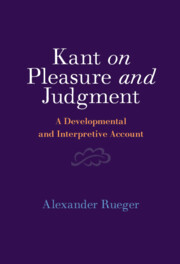Book contents
- Kant on Pleasure and Judgment
- Kant on Pleasure and Judgment
- Copyright page
- Contents
- Acknowledgments
- Abbreviations
- Introduction
- 1 The Early Reception of the Third Critique
- 2 The Completion of the System of the Powers of the Mind, 1770–1790
- 3 Kant’s Theory of the Feeling of Pleasure and Displeasure (I)
- 4 Kant’s Theory of the Feeling of Pleasure and Displeasure (II)
- 5 Consequences of the Theory
- 6 The Principle(s) of the Power of Judgment
- 7 The Interest of the Reflecting Power of Judgment and the Deduction of Judgments of Taste
- 8 The Imagination in Its Freedom
- 9 The Transition from Nature to Freedom
- Conclusion
- Bibliography
- Index
4 - Kant’s Theory of the Feeling of Pleasure and Displeasure (II)
Published online by Cambridge University Press: 19 April 2024
- Kant on Pleasure and Judgment
- Kant on Pleasure and Judgment
- Copyright page
- Contents
- Acknowledgments
- Abbreviations
- Introduction
- 1 The Early Reception of the Third Critique
- 2 The Completion of the System of the Powers of the Mind, 1770–1790
- 3 Kant’s Theory of the Feeling of Pleasure and Displeasure (I)
- 4 Kant’s Theory of the Feeling of Pleasure and Displeasure (II)
- 5 Consequences of the Theory
- 6 The Principle(s) of the Power of Judgment
- 7 The Interest of the Reflecting Power of Judgment and the Deduction of Judgments of Taste
- 8 The Imagination in Its Freedom
- 9 The Transition from Nature to Freedom
- Conclusion
- Bibliography
- Index
Summary
In this chapter I present my reconstruction of Kant’s theory in more detail. One important aspect is Kant’s insistence that the feeling of pleasure is not to be understood as a sensation, occasioned or caused by the representation of an object and separate from the sensations that are involved in the representation. I analyze Kant’s often neglected argument for this claim in § 3 of the Critique and conclude that his view is best understood as an ‘attitudinal’ theory: if a representation satisfies the a priori principle or interest of a faculty, we adopt an attitude of preferring or desiring to have that representation in our mind; equivalently, we say that the representation is purposive for the faculty. In this way the transcendental definition of pleasure, which characterizes the feeling as the tendency of a representation to be maintained in the mind, and the theory of pleasure as interest satisfaction are combined.
Keywords
- Type
- Chapter
- Information
- Kant on Pleasure and JudgmentA Developmental and Interpretive Account, pp. 62 - 84Publisher: Cambridge University PressPrint publication year: 2024

